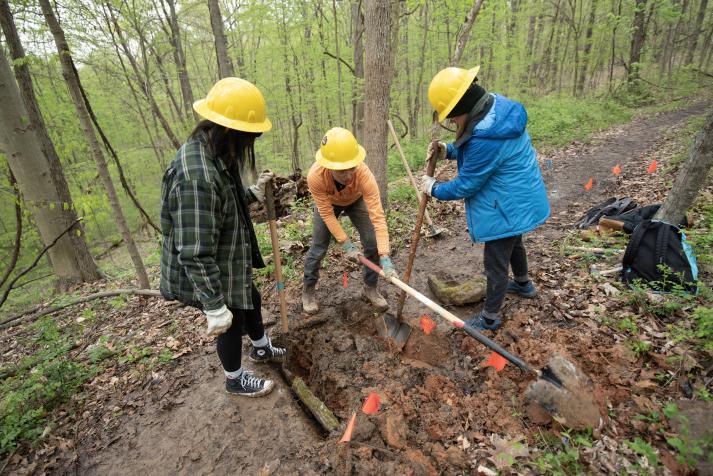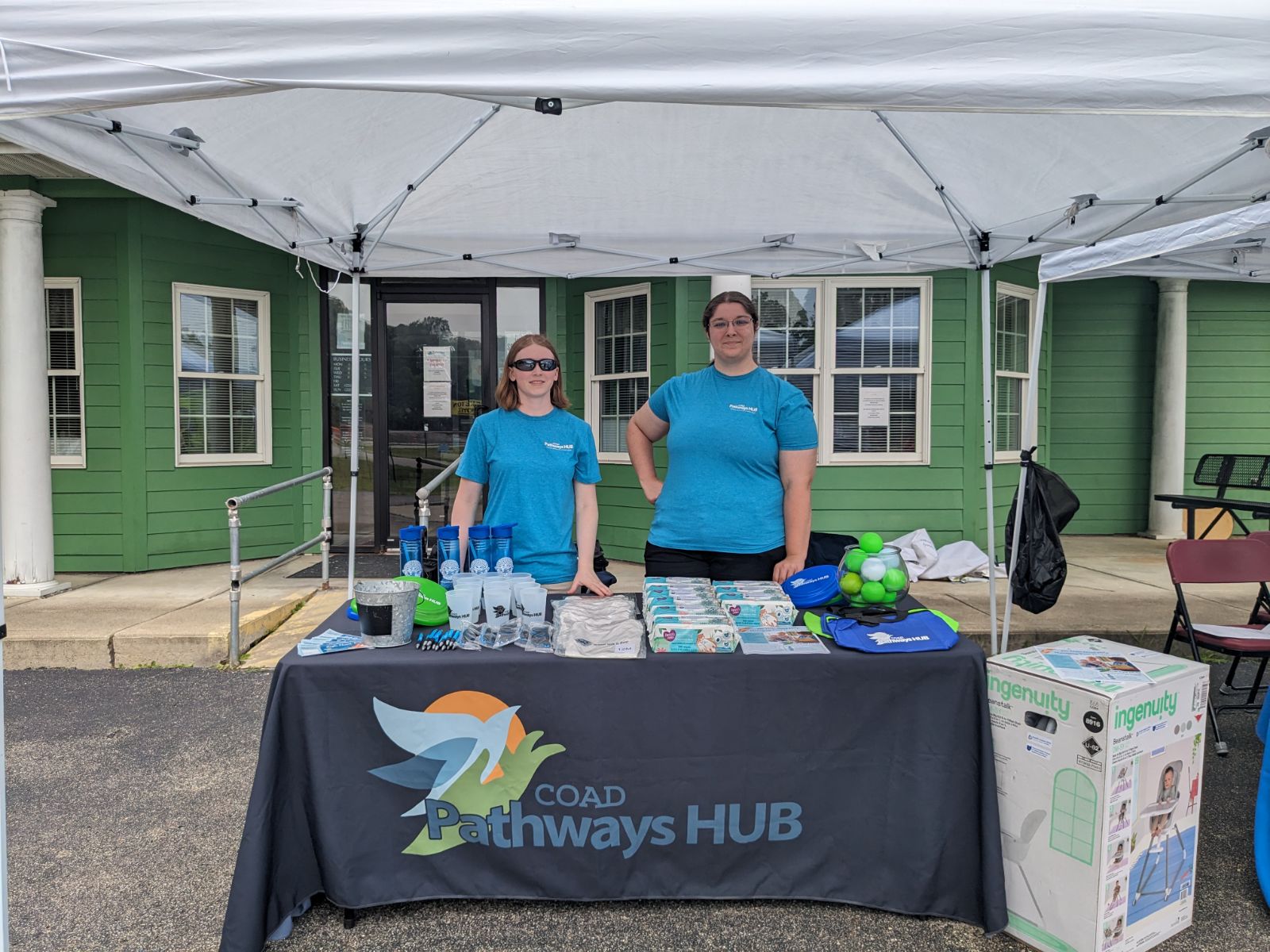Community Based Internship Program provides students and local organizations with mutual benefits
Five OHIO students completed Community Based Internships over the summer through the Center for Campus and Community Engagement (CCCE).
Local organizations in the nonprofit and public sector spaces accepted these students as interns through the Community Based Internship Program for Summer 2023. The program focuses on providing students and organizations with internships that are mutually beneficial and leave a lasting positive impact on southeast Ohio.
Soren Starkey, an OHIO senior who completed an internship at the Mount Zion Black Cultural Center, said he sought to find a summer position where impact left on the community could be measured, which he initially thought might have been best to do through voluntary community service.
“I found [the program] because I’ve spent the last few years during my summers and a little bit during the school year doing a lot of programs that are very academic based, and I have a love for academia, but I also understand that in a lot of ways, academia is kind of sheltered,” Starkey said. “I thought that if I’m about to graduate, my time might better be spent, at least for a summer, doing something that immediately impacts people.”
The CCCE partnered with Rural Action this summer to present students with AmeriCorps VISTA positions at their internships. Students made a livable allowance, received a Segal Education Award, and were granted a partial match from the Center for Campus and Community Engagement.
The five organizations partnered with the CCCE for this year’s program were, Building Bridges to Careers, the Corporation for Ohio Appalachian Development, the Mount Zion Black Cultural Center, the Outdoor Recreation Council of Appalachia, and the Survivor Advocacy Outreach Program.
Emily Jones, a 2023 graduate of Ohio University and an incoming first year graduate student, said her understanding of nonprofit work grew while interning with the Survivor Advocacy Outreach Program (SAOP). With all the services SAOP provides to survivors of sexual violence and southeast Ohio, Jones was not completely sure how the organization has been able to make it all happen.
“I have so much respect for all of the work that is being done over there,” Jones said. “Not just on the direct service side of things, but also on the administrative team, and how they are able to sort of marry those two things together so well. From an outsider perspective it just looks so seamless.”
During her internship, Jones sat in on administrative meetings and contributed to projects as they came alive. She was also involved in grant writing for the organization, and Gretchen Gregory, the grants manager at SAOP, said Jones wrote an application for an accessible van.
“She was great to work with and she was a very quick learner and didn’t need a whole lot of direction,” Gregory said. “I know if we get the accessible van funding, then that will have a big impact on the clients we serve.”
A fellow recent graduate of OU, Katelyn Rousch, spent the summer with the Corporation for Ohio Appalachian Development (COAD) as a Pathways HUB intern. The COAD Pathways HUB helps connect people with Community Health Workers (CHWs) who assist in care coordination. Rousch said CHWs can help with housing, utilities, transportation, childcare, and “all the things you think could potentially impact your health.”
One of Rousch’s roles during the internship was to collect demographic data of the 15 counties COAD Pathways HUB serves in Ohio. Rousch looked at what resources, programs, and organizations exist in these counties based on what their demographics indicated a need for. And although she did not get to drive the company car herself, a role reserved for COAD employees, Rousch was able to travel to the cities of Ironton and Portsmouth as well as the village of Piketon for COAD events and to connect with Community Action Agencies.
Beyond collecting demographic data, Rousch interviewed community health workers about their needs and what organizations they mainly depend on to get services to their clients. She also helped COAD collect necessary documents for the organization to be recertified as a Pathways HUB.
“I think the community planning specifically, and learning to develop communities around these environmental and social factors of health is something that’s really interesting to me,” Rousch said. “And I don’t know if I would have realized how interesting that was and how essential that was without this kind of position.”
While Rousch helped to establish COAD Pathways HUB’s mission through the recertification process, other interns such as Starkey saw their organization’s mission being added to. As a research and communications intern at the Mount Zion Black Cultural Center over the summer, Starkey said the Mount Zion Baptist Church Preservation Society also became the Mount Zion Black Cultural Center.
From focusing mostly on preserving history to creating a new future, Starkey said Mount Zion is working toward becoming a distinct Black cultural center for Athens residents. Throughout his internship, Starkey worked to make Black history in Ohio a more accessible topic to learn about.
“One thing that I’ve done is I have created and programmed a digital archive,” Starkey said. “It’s a website of Black history in the region that allows people to search particular time periods if they want to know about historical events.”
The website, Starkey also said, accepts information from people who have a piece of Black history to share themselves. And because there are also more than just the one Mount Zion Baptist Church in Athens, Starkey made a Wikipedia page dedicated to a list of the churches around the United States.
“His expertise kind of overwhelms me,” said Trevellya Ford-Ahmed, a board member at the Mount Zion Black Cultural Center. “Our knowledge and outreach and social media has not been great. Well, Soren has rectified that for sure. In all kinds of ways.”
The roles students had at their internships may not have completely aligned with their majors and studies at OU, but the skills were still applicable. Payton Brooker, an incoming senior studying journalism, said although he did not find a traditional news internship, working with Building Bridges to Careers related back to his major.
Building Bridges to Careers (BB2C) engages students, businesses, and communities with one another to support career pursuits. Brooker knew about BB2C through his high school and, along with students from other universities in Ohio, led the organization’s Summer STEAM Camp. Incoming freshmen to rising seniors in high school participated in various activities and projects centered around science, technology, engineering, art, and math.
“We had 17 kids come through and I organized the groups of four or five,” Brooker said. “The goal was to get kids involved during the summer and get them still thinking going into their next year of school.”
In helping to lead the event, Brooker also captured photos and videos of what the students accomplished. He even wrote a blog for BB2C detailing their STEAM Camp and its successes. Brooker said some of the high school students got done with their projects earlier than anticipated and were wondering what they could take on next.
“The kids were very very smart [and] they were very organized,” Brooker said. “We had a lot of very successful students, and I heard a response that they would actually come again.”
Another intern in the Community Based Internship Program’s 2023 cohort, Emily Sebring, will be following similar suit as the high school STEAM Camp attendees. Sebring interned with the Outdoor Recreation Council of Appalachia (ORCA) this summer and will continue working with the organization through the Community Work Study program.
As an incoming junior studying visual communications, Sebring took over ORCA’s social media and has contributed to the designs and graphics of surveys and events – specifically related to fundraising. Sebring never thought she would end up working with ORCA, a council of governments formed to sustainably focus on outdoor recreation as an asset for communities and to develop the Baileys Trail System, but the experience was rewarding.
“The nice thing about working with social media and stuff like that is I get to kind of see people engage with it,” Sebring said. “So, it’s really nice just being able to see the work I’m doing impact communities; the fact that it’s reaching people so they can show up to these things.”
The impact ORCA left on Sebring was mutual. Delia Palmisano, the director of communications and philanthropy at ORCA, said Sebring helped take on tasks and roles that their typical team of three were doing by themselves.
“I think having someone from the university be able to connect with a community partner, and then, as the partner, we then kind of connect with some of these smaller communities that a student might not see otherwise and I think it’s really important,” Palmisano said. “And I think it’s good for us to be able to connect with the amazing resource of these students and provide hands-on experience for them.”

